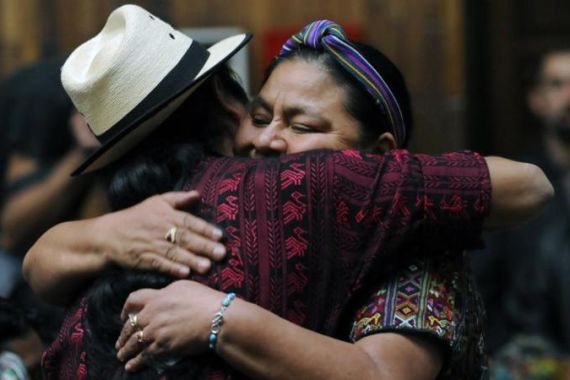The Rios Montt trial looks at the past, but shapes the future of Guatemala
Can a society as divided as Guatemala’s face its past and move forward?

“Lots of people died in ’82, many people; there were massacres, women who had just given birth, they were burned, children, too, were burned. And the mother that had just given birth, how could the baby possibly be to blame; that was the hardest time, the hardest.”
For the next several weeks, a panel of three judges in Guatemala will hear dozens of testimonies like this one, recorded in 1999 by a UN-backed truth commission, of a survivor from an Ixil indigenous village in that country’s remote northern region. After two years of investigation, the commission concluded that during the country’s “Dirty War“, agents of the Guatemalan state committed acts of genocide against the Maya-Ixil people and three other ethnic groups, and that the state had an obligation to investigate and sanction those crimes.
Fourteen years have passed since then, and almost twenty years since peace accords put an end to the armed conflict, but only now, two former generals – José Efraín Ríos Montt and José Mauricio Rodríguez Sánchez – are standing trial in a Guatemalan court on charges of genocide and crimes against humanity, in a trial which began this week, on March 19. Ríos Montt became the de facto head of state after a coup in March 1982 and stayed in power until August 1983, while Rodríguez Sánchez headed military intelligence during the same period, one of the bloodiest in Guatemala’s history.
|
|
| Genocide trial of Guatemala ex-leader opens |
Getting this case to court has been no easy feat in Guatemala, where decades of armed conflict and strict military control of the government left behind an enfeebled and politically compromised judicial system, as well as a deeply entrenched expectation of impunity for even the most heinous of crimes. But the significance of the trial stretches far beyond that small Central American country: it is the first time that a former head of state is being tried for genocide in a credible national court, by the national authorities, in the country where the alleged crimes took place.
What is similarly remarkable is that this is not a classic situation of “victors’ justice”, where the courts do the bidding of a new regime against its old opponents. Guatemala’s current president is another former general who served under Ríos Montt. Just days before the trial was set to start, he declared that there was no genocide in Guatemala, contributing to a highly charged political environment, where judicial independence still depends in large measure on the bravery and integrity of the prosecutors and judges.
Much credit goes to Attorney General Claudia Paz y Paz Bailey for the current policies that have enabled prosecutors to conduct investigations and bring charges against those suspected of having the greatest responsibility for atrocities committed during the country´s armed conflict. Credit also goes to el Centro para la Acción Legal en Derechos Humanos (CALDH), a Guatemalan human rights organisation and la Asociación Justicia y Reconciliación (AJR), a victims’ organisation whose members are survivors from the regions where the actions took place. Against all odds, both organisations worked for years to construct an evidentiary base to contribute to the prosecution, which they have joined as querellantes adhesivos (complementary prosecutor). Finally, the demand for justice and the determination of victim communities have been the driving force and inspiration for all involved.
Public opinion in the lead up to the trial has been highly polarised. The Attorney General has been accused of being a sympathiser of the former insurgency, and prosecutors and judges alike have been under stiff pressure from sectors that supported the military during the war and want to see the trial stopped. In this context, the security of all of the parties involved, including prosecutors, judges, lawyers, witnesses, and victim communities, is of concern.
The trial has just begun and the verdict could be months away. Hundreds of witnesses will give testimony and be questioned and cross-examined, even the exhumed remains of hundreds of mortal victims will “speak” though forensic reports. Dozens of experts will analyse the military campaigns that laid waste to Ixil communities thirty years ago, explain the workings of the chain of command in war time, and examine the role of racism in the conduct of the war by the military. On the genocide charges, prosecutors and defence lawyers will argue on the most central of issues to determine that crime: did the accused act with the intent to destroy, in whole or in part, the Ixil people? Justice hangs in the balance, as does an interpretation of history. Perhaps most importantly, however, the trial will give us a lens into a country’s future: can a society as divided as Guatemala’s face its past and move forward, recognizing the value of the rule of law, where even the most marginalised have the same rights to justice as the powerful?
Marcie Mersky is Program Director at the International Center for Transitional Justice. She worked in Guatemala for more than 20 years, including with the Guatemalan Commission for Historical Clarification.
Follow her on Twitter: @theICTJ
